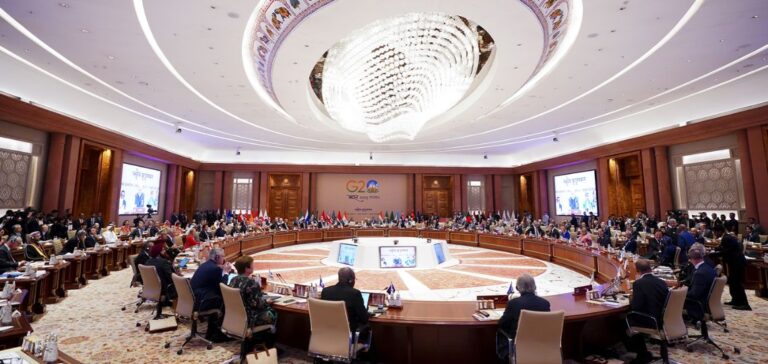Deeply divided on oil, the G20 failed to call for a phase-out of fossil fuels on Saturday, but for the first time backed a tripling of renewables by 2030: a “ray of hope” declaration for some, but a “bare minimum” for others, three months ahead of COP28.
Renewable Energies: The Alternative to G20 Fossil Fuel Disagreements
The future of fossil fuels, the main cause of the increasingly severe climate crisis, is at the heart of this year’s international negotiations, which are due to culminate in December at the 28th United Nations Climate Change Conference in Dubai.
A move away from fossil fuels without CO2 capture (“unabated”) is also deemed “indispensable” in the first official progress report on the Paris Agreement, published on Friday by the UN Climate Organization.
And the G7 approved the principle in the spring, albeit without a timetable. But at the end of the New Delhi summit of the G20, which accounts for 80% of global greenhouse gas emissions (United States, France, Japan, Indonesia, Brazil, etc.),
the final declaration simply calls for “accelerated efforts to reduce coal-fired power generation”, which excludes gas and oil.
The G20, whose geopolitical disagreements are numerous, whether over Ukraine or the rivalry between the United States and China, is also at odds over the future of oil, with major producers such as Saudi Arabia very reticent on the subject.
G20: Climate Target of 1.5°C in Danger despite IPCC Recommendations
– “Surprising progress” – “Leaders agreed on the bare minimum, a repeat of the G20 Bali 2022 coal phase-down commitment”, lamented Lisa Fischer, an expert at think tank E3G.
The G20 leaders recognize, however, that limiting global warming to 1.5°C, the most ambitious objective of the Paris agreement, “requires a rapid, strong and sustained reduction in emissions of 43% by 2030 compared to 2019”, in line with the recommendations of the IPCC (UN Intergovernmental Panel on Climate Change).
And they “note” that emissions are due to peak by 2025. With 2023 on track to become the hottest year ever measured, “this G20 was supposed to show the way to a future without fossil fuels”, reacted Friederike Roder, vice-president of the NGO Global Citizen, denouncing “a very bad signal for the world”.
G20: Historic commitment to triple renewable energies by 2030
A reduction in the use of fossil fuels is one of the ambitions of the President of COP28: Sultan Al Jaber, who is also CEO of the UAE’s national oil company ADNOC, has himself judged their net reduction to be “inevitable and essential”, once the clean energy system of the future has been built.
On this subject, it is notable that the G20 for the first time states that it will “pursue and encourage efforts to triple renewable energy capacity” by 2030, a goal that now seems within reach of a consensus at COP28.
“This declaration sends out a strong signal in favor of climate progress,” hailed Sultan Al Jaber. “This is a significant and surprising breakthrough on the part of the G20,” said Aditya Lolla of energy think tank Ember, hailing “a major U-turn on the part of Saudi Arabia and Russia”.
Greenpeace Criticizes G20: Tripling of Renewables Deemed Timid
For Tracy Carty of Greenpeace International, however, this tripling is only a “timid commitment” that will be achieved through “existing targets and policies”, without any real increase in ambitions,
“Despite record temperatures, fires, drought, floods and other recent disasters that have affected tens of millions of people, G20 leaders have failed to do anything meaningful on climate change this year,” she castigated.
– More money? – The commitment to renewables is “a ray of hope in our fight against climate chaos”, hailed Andreas Sieber of the NGO 350.org.
On condition that rich countries “provide the necessary funding” for the poorest. India, the host country, took advantage of its presidency to position itself as the voice of the “global South”, urging the rich countries to meet their existing commitments – the one, unfulfilled since 2020, to increase annual climate aid to $100 billion – and to go further to help nations protect themselves from future climate disasters.
The declaration warns that climate investments must “increase considerably”, notably through more ambitious funding from multilateral banks and institutions, a crucial and constant demand from developing countries.






















